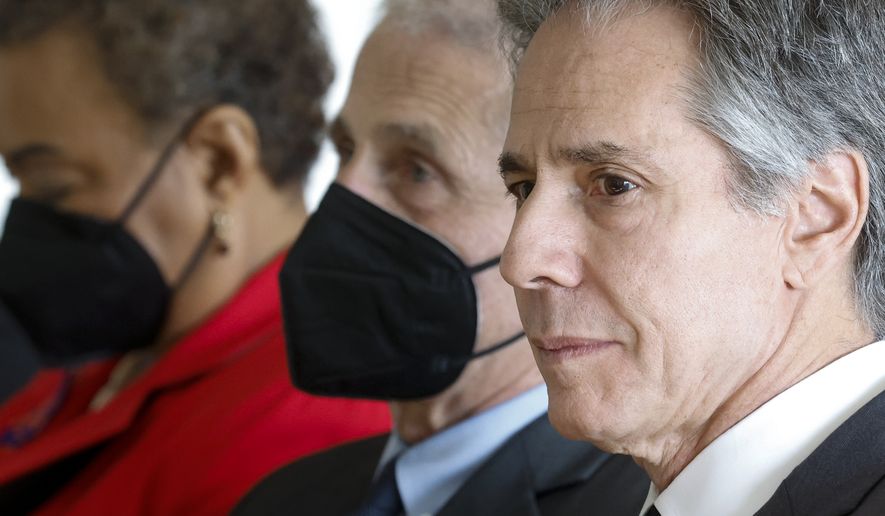The State Department drew fire Friday for again omitting Nigeria from its “Countries of Particular Concern” list of states with religious freedom violations.
The West African nation, where kidnappings and killings of Christians occur on a weekly basis, was first dropped from the CPC list in 2021, enraging advocates and sparking an open letter to President Biden demanding its return.
Under the 1998 International Religious Freedom Act, a CPC designation says these nations have “engaged in or tolerated particularly severe violations of religious freedom.”
An announcement by Secretary of State Antony Blinken on Friday said the CPC list for 2022 consists of Burma (known officially as Myanmar), the People’s Republic of China, Cuba, Eritrea, Iran, Nicaragua, North Korea (DPRK), Pakistan, Russia, Saudi Arabia, Tajikistan and Turkmenistan.
Also omitted from the CPC list is India, where resurgent Hindu nationalism has led to the persecution of the nation’s minority faiths, including anti-conversion laws targeting Christians and a ban in Karnataka state on Muslim female students who wore the hijab.
In the statement, Mr. Blinken said the department would “continue to carefully monitor the status of freedom of religion or belief in every country around the world and advocate for those facing religious persecution or discrimination. We will also regularly engage countries about our concerns regarding limitations on freedom of religion or belief, regardless of whether those countries have been designated.”
The secretary also said the terrorist groups al-Shabab, Boko Haram, Hayat Tahrir al-Sham, the Houthis, ISIS-Greater Sahara, ISIS-West Africa, Jama’at Nusrat al-Islam wal-Muslimin, the Taliban, as well as Wagner Group, a paramilitary firm, were “Entities of Particular Concern.”
Wagner Group, which has been linked to Russian Federation President Vladimir Putin, was singled out for “its actions in the Central African Republic,” he said.
Mr. Blinken‘s statement offered no explanation for the omission of Nigeria, despite the outcry last year.
A State Department spokesperson told The Washington Times that the secretary “determined that the status of religious freedom in Nigeria did not meet the legal threshold to justify Nigeria‘s designation as a Country of Particular Concern or their inclusion on the Special Watch List.”
The spokesperson added, “We continue to have concerns about religious freedom in Nigeria, which are well documented in the annual IRF Report, and we will continue to press the government to address these.”
The spokesperson said that along with designations of Boko Haram and ISIS-WA as “Entities of Particular Concern,” “it has also designated these entities Foreign Terrorist Organizations and Specially Designated Global Terrorists.”
Advocates of religious liberty criticized the decision.
“Secretary Blinken‘s continued refusal to place Nigeria on the list of Countries of Particular Concern (CPC) when the Biden administration should be confronting President [Muhammadu] Buhari is appalling,” said Rep. Chris Smith, New Jersey Republican and ranking member of the House Foreign Affairs subcommittee on Africa.
He pledged to press the administration when the GOP gains the House majority in January.
“The deterioration of human rights in Nigeria — the topic of congressional hearings I have chaired — and the Biden administration’s totally unjustified retreat from the fight to protect victims of religious persecution there will be an oversight item in the new Congress,” Mr. Smith said.
Frank Wolf, a commissioner at the U.S. Commission on International Religious Freedom, called Mr. Blinken‘s failure to apply the CPC label to Nigeria “sorely disappointing” in a post on Twitter.
Mr. Wolf, who as a Republican member of Congress from Virginia authored the 1998 bill setting up the CPC designations, said, “Congress should exercise its oversight authority to ensure religious freedom is a policy priority in Nigeria & support appointing a Special Envoy for Nigeria & Lake Chad Region.”
Lela Gilbert, senior fellow for international religious liberty at the Family Research Council, called the decision “unfathomable.” She said the human rights situation in Nigeria — despite weekly reports of killings and kidnappings aimed at Christians there — is too often “overlooked and ignored.”
USCIRF Chair Nury Turkel, a Uyghur refugee and human rights attorney, said in a statement, “There is no justification for the State Department‘s failure to recognize Nigeria or India as egregious violators of religious freedom, as they each clearly meet the legal standards for designation as CPCs.”
He said the commission — established by Congress to review religious liberty issues abroad and make recommendations to the secretary of state, among others — “is tremendously disappointed” that Mr. Blinken “did not implement our recommendations and recognize the severity of the religious freedom violations that both USCIRF and the [department] have documented in those countries.”
• Mark A. Kellner can be reached at mkellner@washingtontimes.com.




Please read our comment policy before commenting.